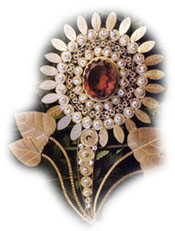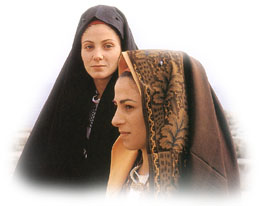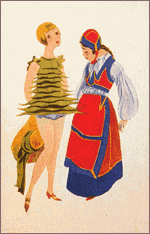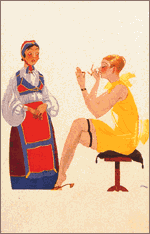 |
|
In fact,
in ancient times, it is said that Sardinian women didn't wait to be asked twice to show
their breast curves. According to many historians there was no malice in the
women's behaviour but only the need to firm up that part of the body
which provided feeding and for this reason was considered essential in the domestic economy
especially if there were children to raise. For this reason, in ancient times, Sardinian wet
nurses were held in great esteem.
|
Anyway the Jesuits did not like the fact that
the breasts were on show and in 1852 they
decided to stop this exhibition. From their point of view, the showing of breasts was a strong
temptation and an incitement to sin. For this reason the Jesuits,
helped by some over-devout parish priests, forced women to cover their breast with a special
cloth. It was the so called "parapettu".
|
|
 |
These prints of original water
colours, by the Sardinian artist Tarquinio Sini (1891/1943), painted in 1927, were published as postcards
in the 1930s. They are reproduced here as a curiosity.
Born in Sassari, resident most of his life in Cagliari, Tarquinio Sini was a cartoonist, a caricaturist and a
graphic artist.
In 1927 he painted 25 water colours entitled "The Contrasts".

|

In an ironic manner they
show the contrast between the austere Sardinian way of life and the freedom of the then
modern lifestyle.
In these two prints "The Nude Little Legs" and "The Lady's Toilette" it is
obvious that the contrast is not only one of clothing but of a clash between the traditional Sardinian
morals and values and the morals and values of the "modern lady".
|
|
|
However the parish priests and Jesuits crowed too soon,
because they had underestimated the astuteness of the women who were apparently obeying
their order. In fact the women invented a movable "parapetto" (breast cover ), which, because
of the body's swaying motion, moved sideways showing more breast than it had been
possible to admire before.
On the other hand, at that time, Sardinian women seemed to have a peculiar ability to show their physical
virtues and to
display their sex-appeal. One of the ways in which they did this was to use the marvellous
jewellery which is part of every costume.
|
|

